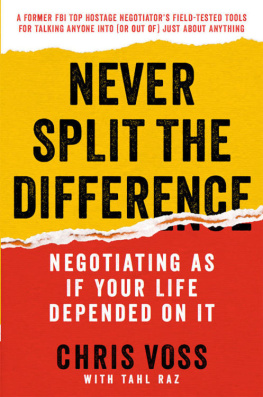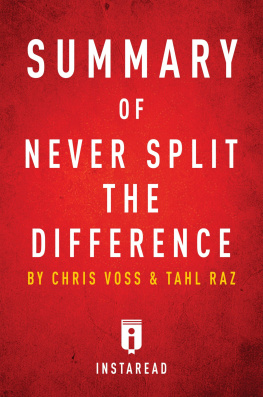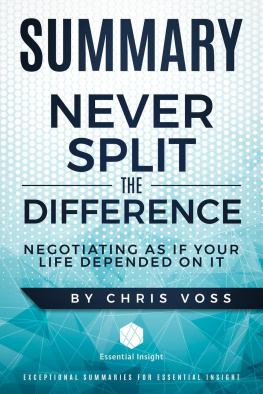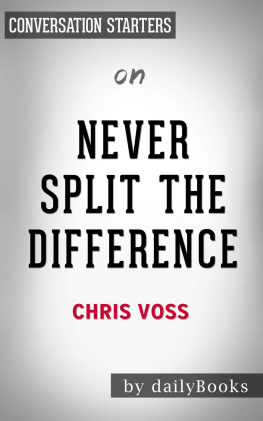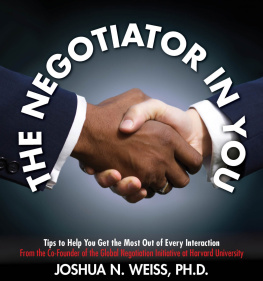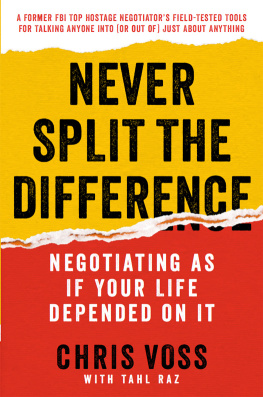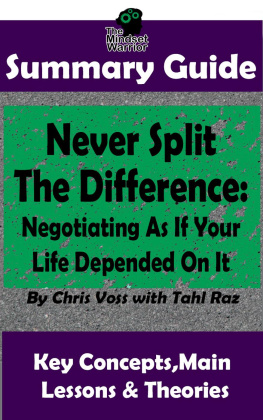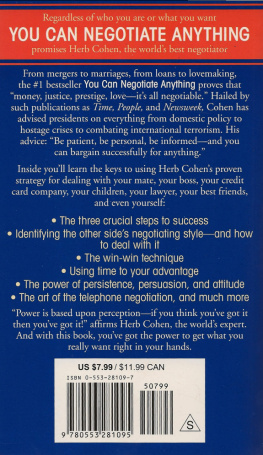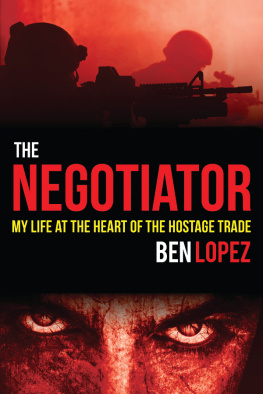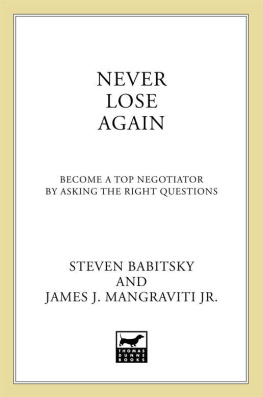I was intimidated.
Id spent more than two decades in the FBI, including fifteen years negotiating hostage situations from New York to the Philippines and the Middle East, and I was on top of my game. At any given time, there are ten thousand FBI agents in the Bureau, but only one lead international kidnapping negotiator. That was me.
But Id never experienced a hostage situation so tense, so personal.
Weve got your son, Voss. Give us one million dollars or he dies.
Pause. Blink. Mindfully urge the heart rate back to normal.
Sure, Id been in these types of situations before. Tons of them. Money for lives. But not like this. Not with my son on the line. Not $1 million. And not against people with fancy degrees and a lifetime of negotiating expertise.
You see, the people across the tablemy negotiating counterpartswere Harvard Law School negotiating professors.
Id come up to Harvard to take a short executive negotiating course, to see if I could learn something from the business worlds approach. It was supposed to be quiet and calm, a little professional development for an FBI guy trying to widen his horizons.
But when Robert Mnookin, the director of the Harvard Negotiation Research Project, learned I was on campus, he invited me to his office for a coffee. Just to chat, he said.
I was honored. And scared. Mnookin is an impressive guy whom Id followed for years: not only is he a Harvard law professor, hes also one of the big shots of the conflict resolution field and the author of Bargaining with the Devil: When to Negotiate, When to Fight.1
To be honest, it felt unfair that Mnookin wanted me, a former Kansas City beat cop, to debate negotiation with him. But then it got worse. Just after Mnookin and I sat down, the door opened and another Harvard professor walked in. It was Gabriella Blum, a specialist in international negotiations, armed conflict, and counterterrorism, whod spent eight years as a negotiator for the Israeli National Security Council and the Israel Defense Forces. The tough-as-nails IDF.
On cue, Mnookins secretary arrived and put a tape recorder on the table. Mnookin and Blum smiled at me.
Id been tricked.
Weve got your son, Voss. Give us one million dollars or he dies, Mnookin said, smiling. Im the kidnapper. What are you going to do?
I experienced a flash of panic, but that was to be expected. It never changes: even after two decades negotiating for human lives you still feel fear. Even in a role-playing situation.
I calmed myself down. Sure, I was a street cop turned FBI agent playing against real heavyweights. And I wasnt a genius. But I was in this room for a reason. Over the years I had picked up skills, tactics, and a whole approach to human interaction that had not just helped me save lives but, as I recognize now looking back, had also begun to transform my own life. My years of negotiating had infused everything from how I dealt with customer service reps to my parenting style.
Cmon. Get me the money or I cut your sons throat right now, Mnookin said. Testy.
I gave him a long, slow stare. Then I smiled.
How am I supposed to do that?
Mnookin paused. His expression had a touch of amused pity in it, like a dog when the cat its been chasing turns around and tries to chase it back. It was as if we were playing different games, with different rules.
Mnookin regained his composure and eyed me with arched brows as if to remind me that we were still playing.
So youre okay with me killing your son, Mr. Voss?
Im sorry, Robert, how do I know hes even alive? I said, using an apology and his first name, seeding more warmth into the interaction in order to complicate his gambit to bulldoze me. I really am sorry, but how can I get you any money right now, much less one million dollars, if I dont even know hes alive?
It was quite a sight to see such a brilliant man flustered by what must have seemed unsophisticated foolishness. On the contrary, though, my move was anything but foolish. I was employing what had become one of the FBIs most potent negotiating tools: the open-ended question.
Today, after some years evolving these tactics for the private sector in my consultancy, The Black Swan Group, we call this tactic calibrated questions: queries that the other side can respond to but that have no fixed answers. It buys you time. It gives your counterpart the illusion of controlthey are the one with the answers and power after alland it does all that without giving them any idea of how constrained they are by it.
Mnookin, predictably, started fumbling because the frame of the conversation had shifted from how Id respond to the threat of my sons murder to how the professor would deal with the logistical issues involved in getting the money. How he would solve my problems. To every threat and demand he made, I continued to ask how I was supposed to pay him and how was I supposed to know that my son was alive.
After wed been doing that for three minutes, Gabriella Blum interjected.
Dont let him do that to you, she said to Mnookin.
Well, you try, he said, throwing up his hands.
Blum dove in. She was tougher from her years in the Middle East. But she was still doing the bulldozer angle, and all she got were my same questions.
Mnookin rejoined the session, but he got nowhere either. His face started to get red with frustration. I could tell the irritation was making it hard to think.
Okay, okay, Bob. Thats all, I said, putting him out of his misery.
He nodded. My son would live to see another day.
Fine, he said. I suppose the FBI might have something to teach us.
I had done more than just hold my own against two of Harvards distinguished leaders. I had taken on the best of the best and come out on top.
But was it just a fluke? For more than three decades, Harvard had been the world epicenter of negotiating theory and practice. All I knew about the techniques we used at the FBI was that they worked. In the twenty years I spent at the Bureau wed designed a system that had successfully resolved almost every kidnapping we applied it to. But we didnt have grand theories.
Our techniques were the products of experiential learning; they were developed by agents in the field, negotiating through crisis and sharing stories of what succeeded and what failed. It was an iterative process, not an intellectual one, as we refined the tools we used day after day. And it was urgent. Our tools had to work, because if they didnt someone died.
But why did they work? That was the question that drew me to Harvard, to that office with Mnookin and Blum. I lacked confidence outside my narrow world. Most of all, I needed to articulate my knowledge and learn how to combine it with theirsand they clearly had someso I could understand, systematize, and expand it.
Yes, our techniques clearly worked with mercenaries, drug dealers, terrorists, and brutal killers. But, I wondered, what about with normal humans?
As Id soon discover in the storied halls of Harvard, our techniques made great sense intellectually, and they worked everywhere.
It turned out that our approach to negotiation held the keys to unlock profitable human interactions in every domain and every interaction and every relationship in life.
This book is how it works.
THE SMARTEST DUMB GUY IN THE ROOM

